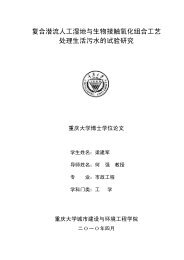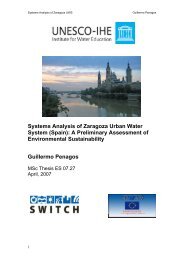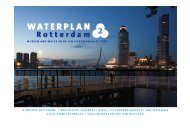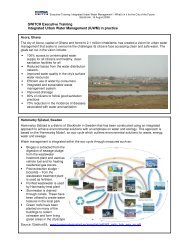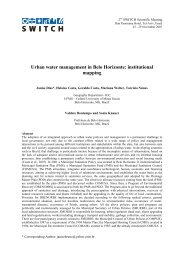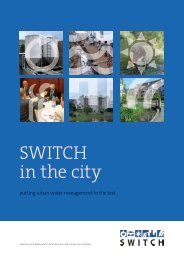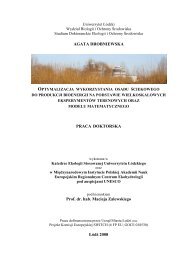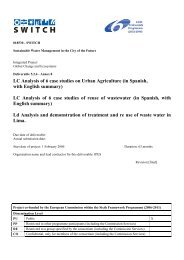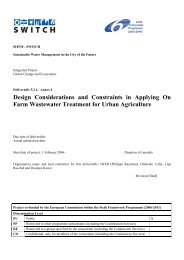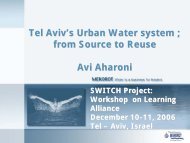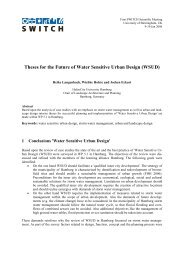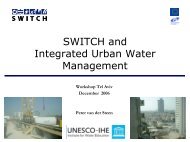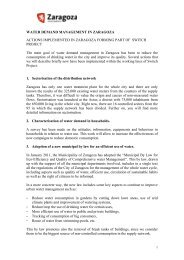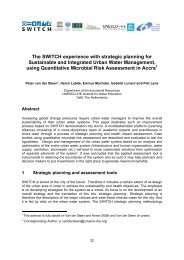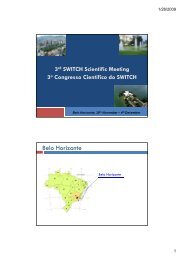Good practices for Social inclusion - Case studies and summary
Good practices for Social inclusion - Case studies and summary
Good practices for Social inclusion - Case studies and summary
Create successful ePaper yourself
Turn your PDF publications into a flip-book with our unique Google optimized e-Paper software.
− Using the cooperation networks <strong>and</strong> methods pilot projects were selected which<br />
increase access to water resources <strong>for</strong> socially excluded groups.<br />
− Local ownership <strong>and</strong> increased confidence witnessed (especially of women) to voice<br />
their interests <strong>and</strong> assert their rights<br />
Conclusions on social <strong>inclusion</strong><br />
It is becoming increasingly recognised that sharing responsibilities <strong>and</strong> influence with users is<br />
vital to effectively identify, analyse <strong>and</strong> address water management problems. Improving<br />
water governance requires financial resources, monitoring systems <strong>for</strong> in<strong>for</strong>mation collection<br />
<strong>and</strong> sharing, monitoring systems <strong>for</strong> the <strong>inclusion</strong> of marginalised groups <strong>and</strong> good<br />
facilitation.<br />
The participatory approaches <strong>and</strong> planning tools used in EMPOWERS have helped generate<br />
knowledge, attitudes <strong>and</strong> <strong>practices</strong> needed <strong>for</strong> better, stakeholder-led, water governance. The<br />
following are the specific conclusions from the project experiences:<br />
<br />
<br />
<br />
<br />
<br />
Representation <strong>and</strong> influence. For the most marginalized groups within communities<br />
to influence decision-making, representation must be seen to be legitimate. The<br />
involvement of community members from the onset of the project helped build their<br />
trust in the process <strong>and</strong> their commitment. Joint activities helped to overcome an<br />
initial lack of trust between groups.<br />
Facilitation. One of the most important conclusions from EMPOWERS was that<br />
maintaining <strong>and</strong> facilitating dialogues at the various levels cannot be left to<br />
stakeholders themselves. EMPOWERS identified the need <strong>for</strong> a full time process<br />
manager as well as a high level facilitator in each country to facilitate the process.<br />
Also, the facilitation team requires people with different kinds of expertise, both<br />
technical <strong>and</strong> social.<br />
Expertise on gender <strong>and</strong> poverty. The EMPOWERS guidelines advise that each team<br />
should have a poverty <strong>and</strong> gender expert to develop a strategy <strong>for</strong> the involvement of<br />
the poorest <strong>and</strong> most marginalized. The project team looked <strong>for</strong> champions from all<br />
stakeholder groups who could enthuse others <strong>and</strong> increase commitment <strong>and</strong><br />
ownership of the process.<br />
Sharing in<strong>for</strong>mation <strong>and</strong> lessons. The project has produced extensive documentation<br />
including papers, presentations, training <strong>and</strong> a website <strong>and</strong> data base on IWRM.<br />
EMPOWERS also engaged with policy makers, NGOs, donors <strong>and</strong> media through<br />
regional networks <strong>for</strong> water resources management. Training based upon the<br />
guidelines has been well received across the region. At community level, in<strong>for</strong>mation<br />
sharing was also key to social <strong>inclusion</strong>: To contribute to improved governance,<br />
in<strong>for</strong>mation had to be shared in a way that is appropriate to the educational levels <strong>and</strong><br />
needs of stakeholders from different backgrounds.<br />
Ownership. The approach <strong>and</strong> methods, with learning plat<strong>for</strong>ms at all levels <strong>and</strong> a link<br />
with participatory problem solving in the field led to a high sense of ownership with<br />
all parties. The EMPOWERS Thematic Group, a knowledge network on participatory<br />
planning <strong>for</strong> improved local water governance, builds upon the existing work <strong>and</strong><br />
experience gained by the partners in the EMPOWERS Project.<br />
122



